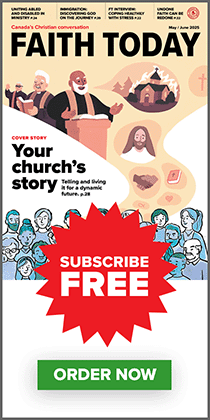Promoting the sanctity of human life across all generations

→en français
Imagine requiring ongoing medical treatment or needing basic supports to sustain your life. As hassle-free, hastened death is increasingly normalized and promoted, the message being communicated is this – We’re not sure we can provide adequate care, but we are willing to kill you.
Our societal response to those suffering is quite different than the Covid rallying cry, "We’re all in this together." Rather than ensuring all Canadians have access to high-quality mental health programs, palliative care and additional supports needed to live such as quality PSW screening/training, decision makers are now expanding eligibility to hastened death.
Since the Supreme Court ruled in 2015 that hastened death can in some circumstances be a legitimate expression of your dignity and autonomy, this logic has led to continual pressure for expansion – with mature minors being among the next groups considered for access.
The government recently reported 7,595 hastened deaths in 2020, compared to 5,660 in 2019 – a 32.4 per cent increase.
The question "Am I my brother’s keeper?" (Genesis 4:9) is increasingly relevant. God’s response was, "What have you done?"
Other Scripture passages admonish us to go beyond caring for our household (1 Timothy 5:8) and the community of faith (Acts 4:32) to include neighbours and strangers (Philippians 2:4, Matthew 25:40, Luke 10:25–37).
The "never again" health care vision was driven by the resolve to uphold dignity and respect for all persons.
Right after the Second World War Canadians embraced this obligation and expressed it in universal health care. Medicare was birthed in the wake of rejecting eugenics and its prioritizing of whose life was most worth living – and the atrocities done in its name. The "never again" health care vision was driven by the resolve to uphold dignity and respect for all persons. It was a societal expression of a consensus on the sanctity of human life.
In one of our many Supreme Court appearances defending the sanctity of human life over decades, the EFC (this time with the Canadian Conference of Catholic Bishops) stated our biblically based belief that humans are created in the image of God and that human life "must be valued, respected and protected throughout all its stages."
We showcased how a broader societal commitment to human life is the cornerstone of Canadian civil and criminal law and not just a religious preference. As the Law Reform Commission put it in 1980: "Our society recognizes that, morally, religiously, philosophically and socially, human life merits special protection. This recognition of life’s fundamental importance has often been expressed through the concept of the sanctity of human life."
The majority of judges agreed in a 1993 ruling, saying there is a "generally held and deeply rooted belief in our society that human life is sacred or inviolable" (using these terms in a "non-religious sense") and that "human life is seen to have a deep intrinsic value of its own."
They also noted they saw no consensus opposed to restrictions on assisted suicide. The balance between autonomy and the sanctity of human life tilted toward a societal commitment to life.
86% OF CANADIANS SEEKING HASTENED DEATH GAVE THE REASON AS THE LOSS OF ABILITY TO ENGAGE IN MEANINGFUL ACTIVITIES
But by 2015 that consensus had changed. While the Supreme Court affirmed respect for life, it decided individual autonomy in some circumstances can outweigh the sanctity of human life – that exceptions should be allowed.
This balance continues to shift as the criteria of who qualifies for hastened death is expanded. At the same time, economic commitments to improve the quality and availability of palliative care and long-term care have lagged behind. For 86 per cent of those seeking hastened death in 2020, their reason for requesting it was the loss of ability to engage in meaningful activities, according to a government report. It’s not physical pain but the loss of meaning in life.
How can we respond?
Individuals, families and communities can volunteer and give practical expression to our affirmation of the sanctity of human life to those nearing death, those needing extra care and minors struggling to find their way in life. This is part of what it means to be our brothers’ and sisters’ keepers.
A continued robust, biblically based presence in Parliament and the courts is the intergenerational witness needed (one the EFC provides) and so too is our advocacy as citizens to re-establish a societal consensus on the inviolability of human life – ever more so in these times.

Bruce J. Clemenger is president of The Evangelical Fellowship of Canada.